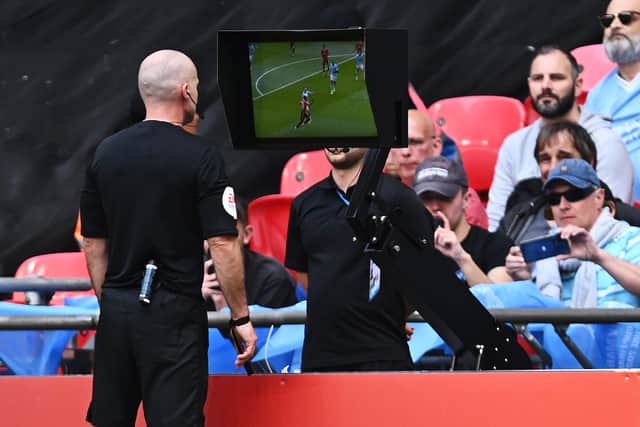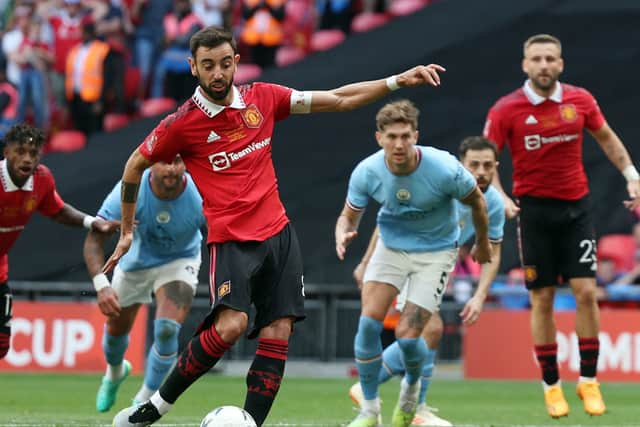Man Utd’s FA Cup final penalty proved that the law is an ass - but the handball rule can be fixed
and live on Freeview channel 276
It would have been an unsatisfying way to decide the FA Cup final, had it been at all decisive – Manchester United’s penalty just after the half-hour mark, scored by Bruno Fernandes and won more by a kink in the rules than by any act of excellence or malevolence, stands as proof of the lingering gulf between the laws and the expectations of fans. By the laws, it was a penalty. By any measure of sense, it probably should not have been.
Fernandes’ goal could easily have stood alongside Mohamed Salah’s second-minute penalty against Tottenham Hotspur in the 2019 Champions League final as a key penalty in a big game that left the neutral viewer more frustrated than anything else. The handball law was the culprit there, too, as it so often is – and since that match in Madrid, VAR has only served to complicate matters further. The gap between what ‘should’ be in such cases and the reality of the rules is, at least, a bridgeable gap. This can be fixed.
Advertisement
Hide AdAdvertisement
Hide AdTo recap, for anyone who missed the incident on Saturday – a ball over the top and down the flank gave United’s Aaron Wan-Bissaka a chance to play the ball across goal with a header. The backpedalling Jack Grealish, covering in the left-back position but beaten in the flight, jumped and turned as Wan-Bissaka made his play. The full-back’s header flicked off of Grealish’s fingers, the Stockley Park machine rumbled into action, and a penalty was awarded and scored.


There are three big problems with such penalties, none of which have anything to do with the on-field referee, Paul Tierney, or the VAR team, led by David Coote in this case. They interpreted the laws correctly based on the current guidelines. The decision was not a mistake, nor evidence of a conspiracy. The officials are told how to enforce the laws of the game, and did their job correctly. They cannot, and should not, apply “common sense” – not least because it could never be applied evenly across games.
The first major issue is the language surrounding handball. For years, the laws of the game have refereed to “deliberate” handball. The way referees are asked to interpret deliberateness has changed over the years, but the wording has not, and it is now ingrained into the fans’ consciousness as a yardstick by which handball should be judged.
And of course, we all “know” that Grealish’s handball was not deliberate by any dictionary definition of the word. His arm was out to balance him as he turned and fell, and it is highly unlikely that he was remotely aware of the ball’s trajectory. That immediately sets off the alarm bells in fans’ minds – if a handball has to be deliberate to be a penalty, how can such a plainly unintentional act meet the threshold?
Advertisement
Hide AdAdvertisement
Hide AdIt does, of course, because the referees are asked to judge handball by the movement of the arms, not by some kind of psychic reading of the possible offender’s intentions. The arm moved up and away from the body. The rules and guidelines say the officials should, therefore, give a penalty, which they did. The law may be an ass, but the officials were in the right on this one. The problem is the language – basic communications theory says that the incessant use of “deliberate” within the rules creates an expectation that the rules absolutely fail to meet. It isn’t the only chapter of the lawbook which has this problem – the rules over when a defender touching the ball creates a second phase for offside decisions has exactly the same issue. A review of the wording might make decisions like this easier to process for the viewing public.
The second concern is that there is a division between the way the laws and guidelines work for handball and the way they function for other possible penalties – a division created by VAR. A perfect case in point was the non-award of a penalty for Fred’s foul on Kevin de Bruyne, when the Brazilian midfielder appeared to impede his Belgian counterpart just inside the box.
Was it a foul, on replay? Yes, says the “common sense” and gut instinct of the viewer. But no, says VAR – and so we infer incompetence or conspiracy. In reality, the guidelines in use are simply wildly different.
Since VAR’s introduction, the guidelines for handball have been subject to a complete and comprehensive overhaul, intended to provide a framework for a ruling on any conceivable handball situation that occurs on the field. Those guidelines mean that, rather than using personal judgement, referees have a strict checklist to work down which should provide a clear yes or no answer for every such incident. The results may be unsatisfactory at times, but they are at least subject to a very strict set of regulations.
Advertisement
Hide AdAdvertisement
Hide AdWith contact fouls, such as Fred’s potential offence, no such “flow chart” system applies. The calls are left to the interpretation of the officials, and because VAR has been set a very high bar to intervene in England, unless the alleged foul’s presence or absence goes beyond reasonable doubt, the on-field referee’s decision is almost always stuck with – even when our good friend “common sense” dictates that the decision is wrong. The chances are that, in his own mind, seeing the replays, David Coote probably thought it was a foul – but the guidelines said he should not intervene as there was room for interpretation.
That isn’t fair, of course – that some fouls should have a rigid system in place and others not. It creates a divide between handball and other fouls which further frustrates the viewer. Because the guidelines in play are not widely appreciated – not helped by the many pundits in broadcast studios around the country who have no interest in learning them – the public are left wondering why the laws seem to be applied so unevenly.
The third and final major problem is the severity of the punishment – even Manchester United fans, if they took the red-tinged lenses off their glasses, would surely agree that a penalty is not a sentence that fits the crime.


The xG given for a penalty kick is 0.76. Premier League takers tend to do slightly better – 81.6% were scored this season – and the conversion rate drop in high-pressure scenarios like World Cup shootouts, where 70.3% of penalties have been scored over the course of history. So a penalty awarded is worth, depending on the pressure and players involved, somewhere in the region of 70-80% of a goal. Given the importance and scarcity of goals in football match, a penalty is a very severe punishment.
Advertisement
Hide AdAdvertisement
Hide AdSo the bar for what deserves a penalty should be high, but right now it’s effectively any foul in the box, however minor. Most of us would agree that a striker bearing down on the goalkeeper and taken out from behind should win a penalty. Most of us would also agree that a slight deflection off the hand from a wayward cross should not.
So why not investigate the possibility that more fouls in the box should result in an indirect free-kick? A rarely-seen sight since the backpass rules were revamped so long ago, an indirect free-kick in the face of the goal is still a big chance to score, but not nearly as punitive as a spot-kick. Assessing which fouls should get the lesser sentence is a job for those with access to far more data, but it seems a worthwhile experiment.
The other advantage, apart from perhaps aligning crime and punishment more justly, is frankly that indirect free-kicks in the box are great fun. They’re chaotic, intense and dramatic – and almost never happen at the top level in this day and age. The justification for upping their usage isn’t just balance in the laws – it’s also emotional satisfaction.
We want your feedback on 3 Added Minutes - details here
Penalties can, and often do, ruin a match – which at least wasn’t the case in the FA Cup final, where an undeniably just scoreline was reached in a largely one-sided game. Let’s just hope that IFAB, the lawmaking body made up of former officials and players, is taking the right kind of notes.
Comment Guidelines
National World encourages reader discussion on our stories. User feedback, insights and back-and-forth exchanges add a rich layer of context to reporting. Please review our Community Guidelines before commenting.
